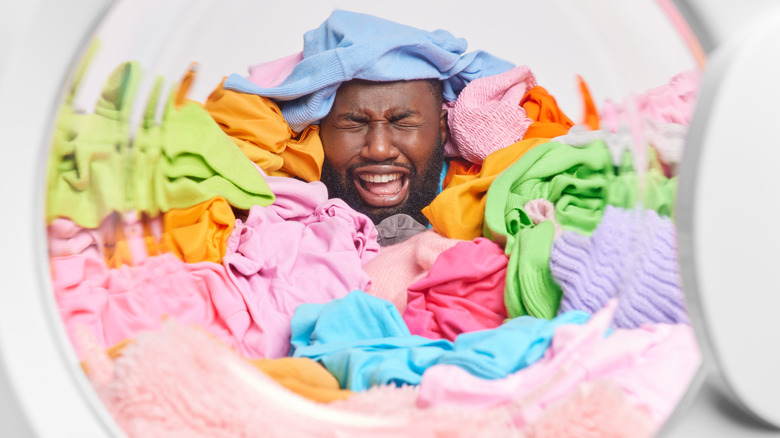5 Key Signs Your Washing Machine Is About To Break
When a crucial appliance unexpectedly goes offline, many people may not realize that losing such a pivotal part of keeping the household on track is more than just a minor inconvenience. A faulty refrigerator or defective dishwasher can make things around the house more difficult and time-consuming. In addition, the repair costs or money needed for a replacement is never fun to part with, especially when consumers don't see it coming in the first place.
Being unable to keep food cool or washing loads of dishes at a time are unfortunate circumstances homeowners may find themselves in. But there is no denying that being unable to wear clean clothes due to a broken laundry machine is a downright filthy situation most people would probably like to avoid. Fortunately for those fearful of a similar fate, there is a formula to follow that can help identify if a breakdown is on the horizon.
For generations, the washing machine has been one of the many reliable home appliances that serve as an unsung hero, grinding away in its respective corners, accepting everyone's dirty laundry without judgment, revitalizing every garment it comes into contact with, and restoring its former state of glory.
The convenience of having everything from hoodies to sheets get another chance to shine easily gets taken for granted by many, and no one quite realizes how fortunate they are to have such technology readily available until it's gone. Anyone looking to avoid that calamity and prolong the life of their washer should be on the lookout for certain factors that could be strong indicators the unit might be on the verge of catastrophe.
The washer starts making excessive amounts of noise
It's great that an affordable household appliance exists that cleans clothes faster and more efficiently than ever. But there is no denying the difference-making experience is soured when the device can be heard making life easier throughout the house. Washing machines aren't known for producing an abundance of noise, so if they start causing a ruckus, it may mean some serious problems are happening beneath the surface. While an unbalanced load or excessive amount of clothes put in can sometimes be the culprit for the racket the household appliance is making, if those aren't the causes of the calamity, then the issues could very well stem from a more substantial issue.
The sounds could be anything from unappealing squeaks to loud thumps as if the drum itself is being used as a percussion instrument instead of acting as the circular tub that holds the garments during a wash cycle. When it comes to what could be causing the bumps, grinds, and other clamorous disturbances emitted from the appliance, there are a few things consumers should consider.
The washer may not be level, and the unbalanced situation could be the reason for the racket. Other things to consider revolve around troubles with the motor, a loose mount or drum, or there may be something off with the bearings. Whatever the reasoning may be for the unnecessary loudness, it's probably wise to assess the situation or have the equipment looked at by a professional when the excessive noise gets out of hand.
Leaking water all over the place
Some washers are considered to be some of the most energy-efficient appliances on the market, especially when it comes to how they manage water consumption, which is why one of the leading warning signs that a washing machine is coming close to a breakdown is the unwanted formation of bodies of water in front of and around the unit. Whether it's a small puddle or a tiny river making its presence known in the laundry room, the leak could easily result from a larger issue. While a mop, bucket, and dry vac may provide quick fixes for the watered-down dilemma, when a washer leaks, the unfortunate ordeal should never be taken lightly, and when one unfortunately occurs, it should become a consumer's top priority.
When it comes to washer-related leakages, a variety of culprits may be to blame, including a misaligned door, worn-out pumps, a cracked drum, or a faulty water sensor. There also could be situations where the cause of the overflow of water is the result of the supply hoses being clogged up, broken, or experiencing a loose connection. To see if any of these ordeals are the cause of the problem, inspect the water supply hose located at the back of the machine. If it's disconnected or shows any signs of moisture, it's essential to either reconnect it properly or consider a replacement.
While some of these issues may be easily noticeable and fixable, others may require the expertise of a professional. If people refrain from allowing these lousy leaks to linger longer than necessary, taking care of them as soon as possible can help prevent more significant problems down the laundry line.
Unpleasant smells from the drum and clothes
When things don't smell right with the washing machine, consumers shouldn't just light a candle and hope the problem will go away on its own. While the aroma of the drum stinging the nostrils is frustrating, pulling out clean clothes that contain a fragrance worse than before they were put in is not something people want to experience when washing their garments. The pungent stench can be rather unpleasant, and there is a good chance the stinky whiff is actually a warning that the washer is in trouble and may require potential repairs.
If people are forced to constantly hold their noses shut when opening and closing their washers after each cycle, there may be a few reasons behind the foul-smelling ordeal. The fungal-like fragrance could be mold from moisture buildup, or the dreadful essence could have accumulated over time from oil, dirt, and bacteria after excessive use.
Maintaining proper cleaning routines with the appliance could very well solve the issue. But if chemicals don't get the job done and the stink persists, another suspected cause could be the result of liquid collected from possible leaks inside the equipment, offering up a perfect nesting ground for mildew. Other water-related issues could also explain why things aren't smelling so fresh and clean after every wash.
It's probably best to consult a technician or specialist if the unappealing aroma continues so they can determine what part of the machine is malfunctioning to the point where everyone's nose can tell the appliance is slowly rotting away inside.
Excess water in the drum
It's no secret that water is an essential element when it comes to the washing machine's process of cleaning clothes, and consumers should expect their items to be somewhat wet or damp before they make their way into the dryer. No matter what mess or stains the appliance has to deal with, only a certain amount is needed to achieve the desired results. During the spin cycle, most moisture is drained from the equation, preventing anything from getting more drenched than necessary. But if, after each cycle, people find their garments more soaked than normal or an excessive amount of liquid left over in the drum, those red flags signal that things are not functioning properly with the washer.
One of the main issues that might be causing clothes to come out waterlogged could be that the drum cannot initiate or properly carry out the spin cycle. Several factors could contribute to the problem, including a malfunctioning pressure system or blocked sensor. There is also a chance the consumer may be dealing with anything from weathered carbon brushes to a faulty motor that cannot keep up with the demands of the washer.
But if the complication has to do with drainage, some other transgressors could be responsible. Water remaining in the drum could point to clogged hoses, defective filters, or a damaged water pump. Even though some of these challenges can be repaired or replaced by the owner, it may be wise to seek out a seasoned pro to ensure a flood of additional problems does not engulf the consumer.
The drum refuses to spin
While water and detergents are most assuredly verified game changers in the fight against stains and dirty garments, it's no secret that without the spin, there is no way the washer can win. When using the washing machine, if it becomes clear that the drum is not rotating at all, consumers should understand the machine isn't being stubborn. If the appliance is powered on and running, but no motion is happening, there is definitely a problem that needs to be repaired sooner than later before any laundry can be done.
When it comes to what could be causing the washer's possibly ill-fated spin-less conundrum, there are a few things consumers should consider, such as something going on with the door that is keeping the drum from spinning the dirt out of its loads. Potential causes could stem from a compromised lid sensor, a problem with the cover switch, a malfunctioning door latch, or a faulty interlock. If those aren't the perpetrators of the quandary, the blame could fall on a broken or loose belt.
Then, there is also the chance the complication could be connected to issues with the drains, motor, or other components within the appliance. Whatever the reasoning may be, do not waste time in addressing the matter. While washers are considered by some to be one of the gadgets that are more expensive to repair than buying a new unit, if there is a chance the situation can be rectified, figuring out the next steps is crucial to determine whether to seek professional help or a replacement.





